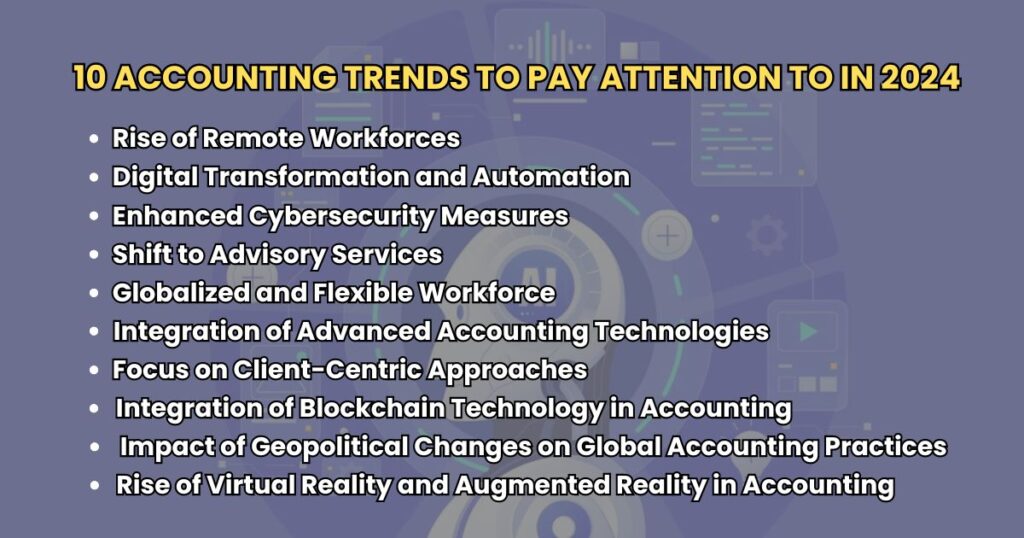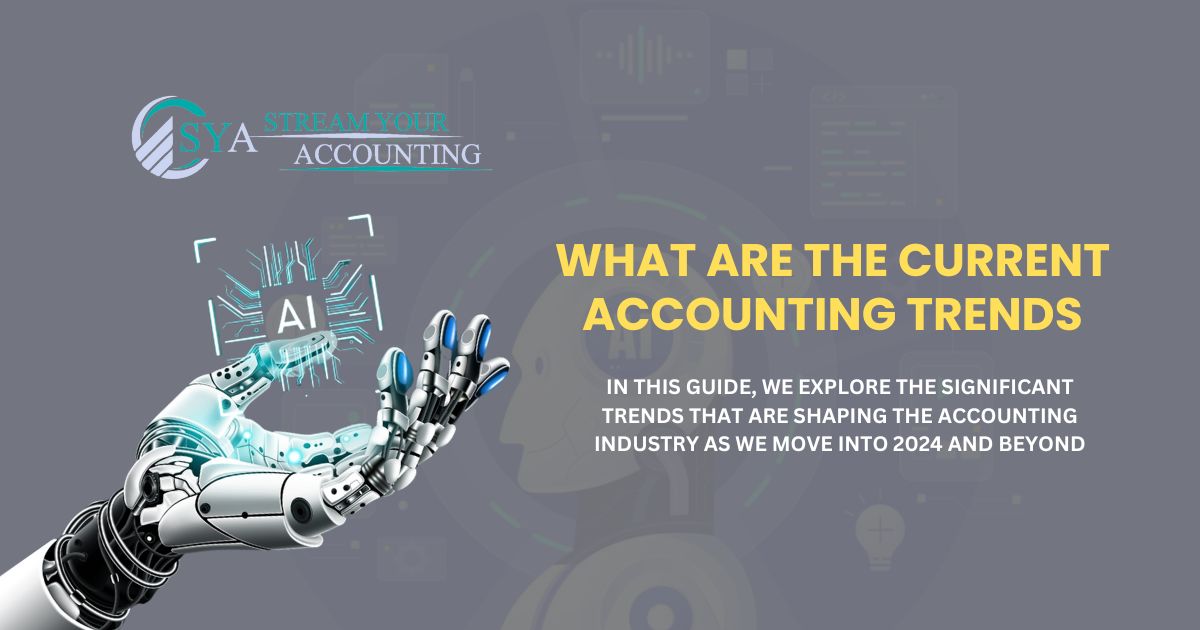Introduction:
The accounting industry has undergone significant changes in recent years, primarily influenced by technological advancements such as digital transformation, the increasing prevalence of remote work, and greater automation. These factors have modernized traditional accounting practices and opened doors to new ways of handling finances and serving clients.
This guide explores the significant trends shaping the accounting industry as we move into 2024 and beyond. How has the shift from old-school accounting functions to cutting-edge digital solutions revolutionized how accountants operate? Come with us as we explore these significant trends shaping the future of accounting.
What are the Current Accounting Trends?

Trend 1: Rise of Remote Workforces
In recent years, the increasing risk of remote work has had a significant impact on the accounting sector. This shift has brought forth several benefits for accounting firms. Firstly, remote work reduces the necessity for physical office space, resulting in significant cost savings. Moreover, accountants working remotely often experience increased productivity due to fewer interruptions and commute times.
However, remote work isn’t without its challenges. An important concern is burnout, especially in fields such as finance and accounting, where work and personal life boundaries can often overlap. Additionally, maintaining effective communication and collaboration among team members scattered across different locations requires deliberate effort.
Accounting firms and their clients are adopting effective management strategies to address these challenges. Setting clear expectations and responsibilities for remote teams is crucial. Providing the right digital tools, such as cloud-based accounting software and video conferencing platforms, ensures smooth day-to-day operations. Regular communication and collaboration sessions further strengthen team cohesion and productivity in a remote work setup.
ALSO READ THIS: What Does a Personal Accountant Do?
Trend 2: Digital Transformation and Automation
The digital transformation has fundamentally reshaped the landscape of accounting, especially in response to the COVID-19 pandemic(Supporting PDF Report 2020). This global crisis underscored the critical importance of modernizing business operations, pushing many accounting firms to accelerate their adoption of advanced technologies like artificial intelligence (AI) and data analytics.
During the pandemic, traditional accounting processes faced unprecedented challenges, prompting firms to embrace automation to sustain operations amidst remote work and disruptions. AI-driven tools are now vital for automating tasks that take up a lot of time, like entering data and preparing financial reports. This allows accountants to concentrate on more strategic tasks.
Using digital tools not only boosts efficiency but also enhances the accuracy and speed of financial insights. By utilizing AI and data analytics, accounting firms can provide more timely and informed financial advice to clients, adapting swiftly to changing economic conditions.
Trend 3: Enhanced Cybersecurity Measures
In the modern era of digital technology, safeguarding cybersecurity has become essential for accounting firms. This is especially true as more businesses adopt remote work setups and increasingly depend on digital tools and platforms. Ensuring the security of financial data is crucial for maintaining trust and confidence among clients and stakeholders.
Remote work has brought new security risks, highlighting the need for firms to strengthen their cybersecurity measures. Risks like phishing scams, ransomware attacks, and data breaches are serious threats to sensitive financial information. These threats highlight the need for proactive defence strategies.
To mitigate these risks, accounting firms should adopt best practices such as multifactor authentication, regular security updates, and employee training on identifying and responding to cyber threats. Implementing these actions helps protect financial information and ensures that companies follow industry rules and regulations.
Trend 4: Shift to Advisory Services
There is a clear movement towards advisory services in the changing world of accounting. This trend shows an increasing request from clients who want more than just following rules and regulations. They now expect strategic insights and proactive guidance from their accounting partners like SYA(Stream Your Accounting).

Advisory services offer several benefits to accounting firms. They enhance client relationships by providing value-added services and diversifying revenue streams beyond traditional compliance work. This shift enables companies to explore fresh avenues for expansion and set themselves apart in a competitive marketplace.
However, balancing compliance work with advisory services can be a challenge. Firms must allocate resources effectively, ensuring compliance obligations are met while dedicating adequate time and expertise to advisory engagements. Advisory services require strategic planning and an understanding of client needs and industry trends.
Trend 5: Globalized and Flexible Workforce
The globalized and flexible workforce is reshaping the dynamics of the accounting industry, driven by changing demographics and evolving expectations. Millennials(born between the 1980s and 2000) now comprise a significant portion of the workforce because they grow with technology and prioritize flexibility and remote work options.
Providing flexible and remote work options has become essential for accounting firms to attract and keep top talent. It not only meets the preferences of younger generations but also accommodates diverse lifestyles and work-life balance priorities. This approach allows firms to tap into a broader talent pool beyond geographical boundaries, enabling them to recruit the best professionals irrespective of location.
To navigate this globalized market effectively, accounting firms need strong talent acquisition strategies. These strategies involve utilizing digital platforms and recruitment tools to reach potential candidates worldwide. Emphasizing the firm’s commitment to flexible work arrangements and career development opportunities can significantly enhance its appeal to prospective employees.

Trend 6: Integration of Advanced Accounting Technologies
In today’s accounting landscape, there’s a notable shift towards using advanced technologies to simplify processes and improve efficiency. An important advancement in accounting is the use of cloud-based software for managing accounting practices. This technology allows accounting firms to store data securely in the cloud, enabling remote access and collaboration among team members.
Artificial Intelligence (AI) and data analytics are essential in revolutionizing traditional accounting methods. AI automates repetitive tasks like data entry and reconciliation, reducing errors and freeing up accountants to focus on strategic initiatives. Data analytics gives firms deeper insights into financial trends and patterns, enabling them to make decisions based on data swiftly.
Another significant advancement is the implementation of workflow management software. This tool improves efficiency by managing how tasks are assigned, tracking the progress of projects, and ensuring that deadlines are met effectively. It’s particularly beneficial for accounting professionals handling multiple clients and complex projects.
By adopting these advanced technologies, accounting firms not only improve how they work but also show they are forward-thinking in a fast-changing industry.
ALSO READ THIS: Super Due Dates 2024-25
Trend 7: Focus on Client-Centric Approaches
Accounting firms are increasingly adopting client-centric approaches to enhance service delivery and satisfaction. This trend focuses on adjusting communication methods to meet clients’ preferences and needs effectively. Whether through video conferencing, digital platforms, or personalized consultations, firms strive to ensure seamless communication channels that align with modern client expectations.
Maintaining strong accountant-client relationships is paramount in today’s competitive landscape. Firms invest in strategies that prioritize regular client engagement, proactive communication, and personalized service delivery. Accountants can develop trust and provide customized solutions by understanding each client’s specific challenges and objectives.
Improving client satisfaction requires maintaining open communication channels and promptly addressing client questions and issues. Accounting firms utilize technology to simplify processes, provide real-time updates on financial matters, and offer value-added insights that go beyond traditional compliance services.
By focusing on client-centric approaches, accounting firms not only differentiate themselves but also provide long-term client loyalty and advocacy in an increasingly interconnected business environment.

Trend 8: Integration of Blockchain Technology in Accounting
Blockchain technology is transforming the accounting industry with its transparent and secure financial transactions. It works using decentralized ledgers, where each transaction is recorded on many computers. This setup makes it extremely difficult to change data without being noticed. Blockchain technology improves transparency and lowers the risk of fraud in financial transactions.
Auditing processes also benefit from blockchain’s unchangeable nature. Auditors can access a transparent trail of transactions, ensuring accuracy and trustworthiness in financial reporting. Fraud prevention is maintained as blockchain’s cryptographic features make altering records extremely difficult.
Blockchain adoption is making accounting operations simpler by boosting efficiency and cutting costs linked to traditional reconciliations and audits. This technology promises a future where accounting practices can operate with unprecedented security and reliability.
Trend 9: Impact of Geopolitical Changes on Global Accounting Practices
Geopolitical changes affect how businesses handle financial reporting and comply with rules across countries. These changes can be due to trade tariffs, political sanctions, or new international agreements. They force companies to adjust how they account for transactions that cross borders.
To manage these uncertainties, accounting firms need to stay updated on global regulations and adapt their financial strategies accordingly. It’s essential to communicate with policymakers and industry experts to prepare for potential changes before they happen.
Recent events like Brexit have shown how geopolitical shifts can lead to changes in financial reporting rules across Europe. Brexit show affects how firms manage risks related to currency exchange rates and meet regulatory requirements.
By being proactive and adapting to geopolitical changes, accounting firms can reduce risks and find opportunities in a rapidly changing global economy.
Trend 10: Rise of Virtual Reality and Augmented Reality in Accounting
Virtual Reality (VR) and Augmented Reality (AR) are transforming how accounting professionals train and analyze financial data. VR and AR applications create engaging training environments that allow accountants to practice real-world scenarios, improving their skills in a safe, controlled setting.
The potential benefits of VR and AR in accounting include improved financial data visualization and analysis. These technologies can create interactive dashboards and 3D models that make complex financial information easier to understand and interpret.
However, integrating VR and AR into accounting firms comes with challenges. Significant initial costs, the requirement for specialized training, and prioritizing data security are critical factors to consider. Firms must also navigate regulatory compliance issues related to using these technologies in financial reporting.
Despite these challenges, the adoption of VR and AR in accounting is expected to grow as firms seek innovative ways to train their staff and enhance client engagement through immersive experiences.

Final Thoughts:
In conclusion, understanding “What are the current accounting trends?” is crucial for staying ahead in the rapidly growing accounting field. These trends, from digital transformation and remote work to cybersecurity and advisory services, reshape how firms operate and serve their clients. Adopting technologies like VR/AR and adjusting to geopolitical changes are key strategies for success. By staying proactive and elegant, accounting firms can navigate these shifts, improve client satisfaction, and achieve sustainable growth in a dynamic global market.


